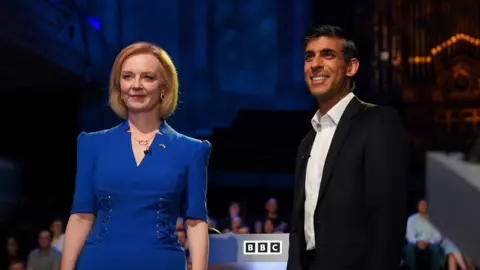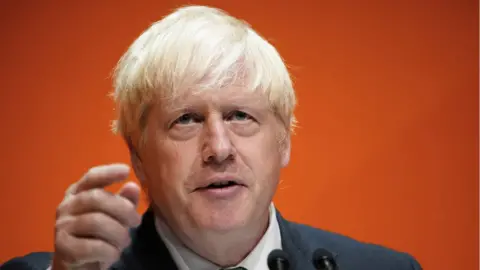Tory leadership: Candidates battle for votes in Northern Ireland
 PA Media
PA MediaLeadership candidates Liz Truss and Rishi Sunak have pledged to progress the government's controversial protocol bill, as they pitched for votes in north Down.
Both have expressed opposition to the Northern Ireland Protocol during the race to become the next PM.
It is the deal agreed by the UK and EU in 2019 that put in place post-Brexit trade arrangements for NI.
The contenders to replace Boris Johnson are staging debates across the UK.
The hustings event, at the Culloden Hotel outside Belfast on Wednesday, gave local Tory members the chance to question the candidates on Northern Ireland-specific issues, as well as other topics such as the cost of living.
As foreign secretary, Ms Truss introduced contentious legislation going through Parliament that would give UK ministers powers to override parts of the protocol.
In June, she defended the use of the bill and said the government had an obligation to act, due to the absence of a functioning executive at Stormont.


Liz Truss and Rishi Sunak stuck to the big themes of their campaigns - but sought to "localise" their messages to the Northern Ireland Conservatives.
Mr Sunak spoke about restoring trust and rebuilding the economy but also made a reference to the negotiating style of the late Ulster Unionist leader Lord Trimble, and mentioned a cross-community festival.
Liz Truss focused on tax cuts and her experience in government - but made sure to mention the Balmoral Agricultural Show and her meetings with NI businesses.
The local issue which came up most prominently in questions was the power-sharing crisis at Stormont.
On this, there wasn't much to split the leadership candidates - with both indicating they believed "fixing" the NI protocol was the key to bringing back the devolved government.

Stormont has been without a power-sharing government since February, due to the Democratic Unionist Party's (DUP) ongoing protest against the Northern Ireland Protocol.
The party is refusing to nominate a deputy first minister until the protocol is changed, meaning a decision-making executive cannot be formed and the legislative assembly cannot operate.
Other ministers can remain in post but they are unable to take major policy decisions.
Both Ms Truss and Mr Sunak have said they would prioritise the restoration of the power-sharing institutions were they to become prime minister.
Ms Truss told the hustings that until the protocol row was resolved: "We are not going to get Stormont back up and running".
"I've been in discussions with all the parties in Northern Ireland and I'm determined to make it happen," she said.
"We will see power-sharing restored in Northern Ireland."
She added that the bill could take time to progress into law if it faces opposition in the Lords in the autumn, but stressed that it was a "priority" for her.
Mr Sunak had previously said his preference for solving the row over the protocol would be a compromise through fresh negotiations with the EU.
However, he told the audience he was committed to "doing whatever it takes to fix the protocol".
Last week, DUP leader Sir Jeffrey Donaldson questioned Mr Sunak's commitment to the protocol legislation.
 PA Media
PA MediaMr Sunak said he would deliver on the bill but said that, while it makes its way through Parliament, he would want to reopen negotiations with the EU.
He said it was "sad" that Northern Ireland was without a functioning devolved government, and that changing that needed to start with the protocol.
Mr Sunak also referenced Lord Trimble, and said east-west relations needed to be repaired.
What is the NI Protocol Bill?
The UK government published plans for the bill in June. At the centre of the proposal is the concept of green lanes and red lanes for trade.
This would mean:
- Goods coming from Great Britain into Northern Ireland and which are staying would use the green lane. This means there would be no checks and paperwork would be minimal
- GB goods moving through NI into Ireland or the wider European Union would use the red lane and continue to be checked at NI ports
London also wants any trade disputes resolved by "independent arbitration" and not by the European Court of Justice, and for Northern Ireland to benefit from the same tax breaks as elsewhere in the UK.
